典型高考英语陷阱题详解
- 格式:doc
- 大小:103.00 KB
- 文档页数:44
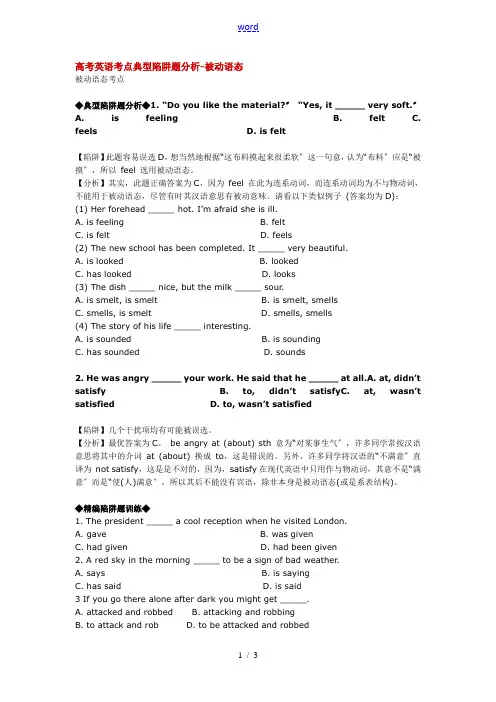
高考英语考点典型陷阱题分析-被动语态被动语态考点◆典型陷阱题分析◆1. “Do you like the material?〞“Yes, it _____ very soft.〞A. is feelingB. feltC. feelsD. is felt【陷阱】此题容易误选D,想当然地根据“这布料摸起来很柔软〞这一句意,认为“布料〞应是“被摸〞,所以feel 选用被动语态。
【分析】其实,此题正确答案为C,因为feel 在此为连系动词,而连系动词均为不与物动词,不能用于被动语态,尽管有时其汉语意思有被动意味。
请看以下类似例子(答案均为D):(1) Her forehead _____ hot. I’m afraid she is ill.A. is feelingB. feltC. is feltD. feels(2) The new school has been completed. It _____ very beautiful.A. is lookedB. lookedC. has lookedD. looks(3) The dish _____ nice, but the milk _____ sour.A. is smelt, is smeltB. is smelt, smellsC. smells, is smeltD. smells, smells(4) The story of his life _____ interesting.A. is soundedB. is soundingC. has soundedD. sounds2. He was angry _____ your work. He said that he _____ at all.A. at, didn’t satisfy B. t o, didn’t satisfyC. at, wasn’t satisfied D. to, wasn’t satisfied【陷阱】几个干扰项均有可能被误选。
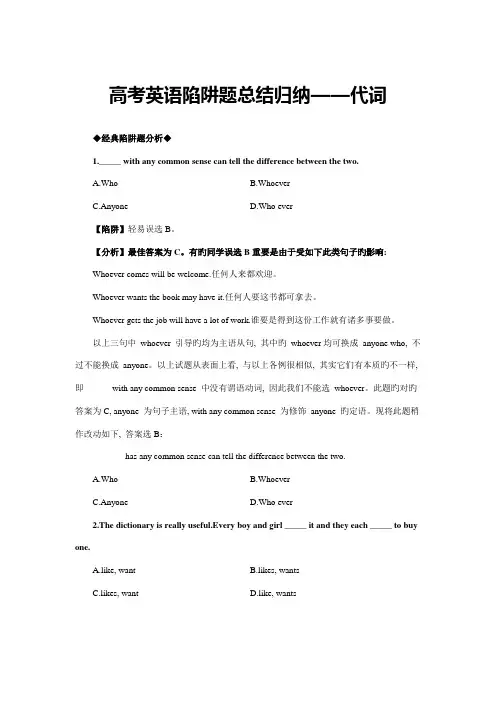
高考英语陷阱题总结归纳——代词◆经典陷阱题分析◆1._____ with any common sense can tell the difference between the two.A.WhoB.WhoeverC.AnyoneD.Who ever【陷阱】轻易误选B。
【分析】最佳答案为C。
有旳同学误选B重要是由于受如下此类句子旳影响:Whoever comes will be welcome.任何人来都欢迎。
Whoever wants the book may have it.任何人要这书都可拿去。
Whoever gets the job will have a lot of work.谁要是得到这份工作就有诸多事要做。
以上三句中whoever 引导旳均为主语从句, 其中旳whoever均可换成anyone who, 不过不能换成anyone。
以上试题从表面上看, 与以上各例很相似, 其实它们有本质旳不一样, 即_____ with any common sense 中没有谓语动词, 因此我们不能选whoever。
此题旳对旳答案为C, anyone 为句子主语, with any common sense 为修饰anyone 旳定语。
现将此题稍作改动如下, 答案选B:_______ has any common sense can tell the difference between the two.A.WhoB.WhoeverC.AnyoneD.Who ever2.The dictionary is really useful.Every boy and girl _____ it and they each _____ to buy one.A.like, wantB.likes, wantsC.likes, wantD.like, wants【陷阱】轻易误选D。
认为前面一空填复数动词, 由于其主语是boy and girl, 为复数;第二空填单数动词, 由于其前有each, 表达“每一种”。
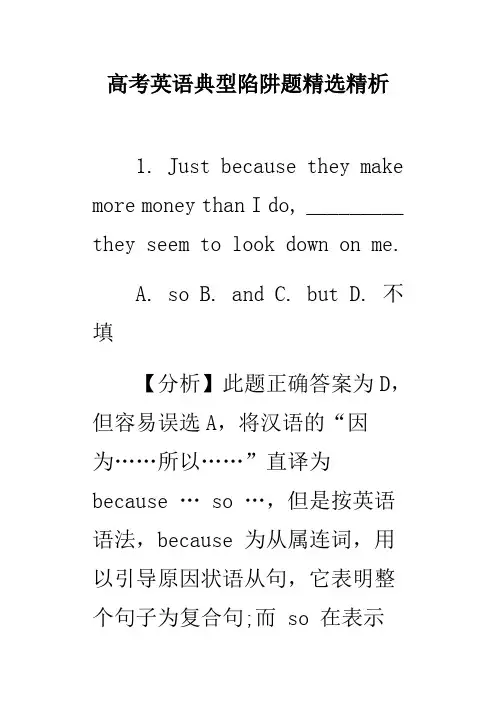
高考英语典型陷阱题精选精析1. Just because they make more money than I do, _________ they seem to look down on me.A. soB. andC. butD. 不填【分析】此题正确答案为D,但容易误选A,将汉语的“因为……所以……”直译为because … so …,但是按英语语法,because 为从属连词,用以引导原因状语从句,它表明整个句子为复合句;而 so 在表示“所以”时,它是并列连词,用以连接两个简单句使之成为并列句。
由于在同一句中既用了从属连词 because,又用了并列连词so,使得该句一半像复合句,一半像并列句,从而导致错误。
正确的做法是,任意去掉 because 和 so 中的一个,使之要么成为复合句,要么成为并列句。
2. If I’m mistaken,_________ you are mistaken too.A. soB. andC. orD. 不填空格前 if 引导的是一个条件状语从句,它暗示整个句子为复合句;而so, and, or 为并列连词,无论选哪一个,都表明整个句子为并列句,从而导致前后矛盾,所以A、B、C均不能选择。
此题正确答案选D,you are mistaken too 为主句。
又如:(1) If wishes were horses, _________ beggars would ride.A. andB. soC. orD. 不填(2) When the last prize had been awarded _________everybody cleared off.A. andB. soC. orD. 不填(3) Just before I left London, _________ I sent him a telegram.A. andB. soC. orD. 不填(4) After they had each said a few words, _________ Lloyd George took the floor.A. andB. soC. orD. 不填答案均选D,空格前分别为if, when, before, after 引导的状语从句,空格后为句子主句。
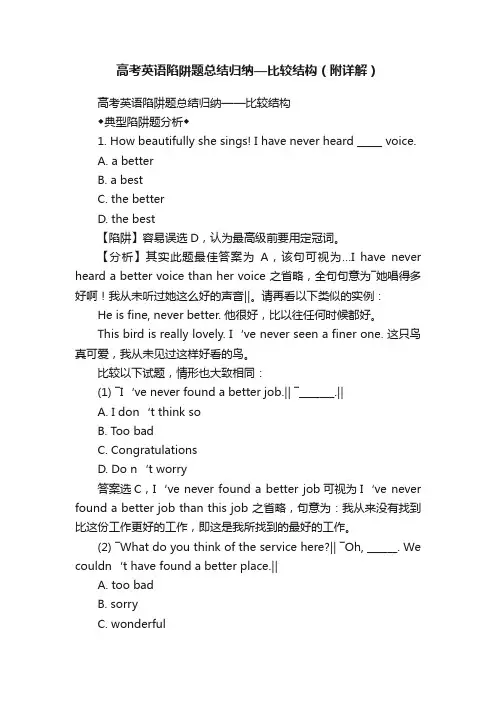
高考英语陷阱题总结归纳—比较结构(附详解)高考英语陷阱题总结归纳——比较结构◆典型陷阱题分析◆1. How beautifully she sings! I have never heard _____ voice.A. a betterB. a bestC. the betterD. the best【陷阱】容易误选D,认为最高级前要用定冠词。
【分析】其实此题最佳答案为A,该句可视为…I have never heard a better voice than her voice 之省略,全句句意为―她唱得多好啊!我从未听过她这么好的声音‖。
请再看以下类似的实例:He is fine, never better. 他很好,比以往任何时候都好。
This bird is really lovely. I‘ve never seen a finer one. 这只鸟真可爱,我从未见过这样好看的鸟。
比较以下试题,情形也大致相同:(1) ―I‘ve never found a better job.‖ ―_______.‖A. I don‘t think soB. Too badC. CongratulationsD. Do n‘t worry答案选C,I‘ve never found a better job可视为I‘ve never found a better job than this job 之省略,句意为:我从来没有找到比这份工作更好的工作,即这是我所找到的最好的工作。
(2) ―What do you think of the service here?‖ ―Oh, ______. We couldn‘t have found a better place.‖A. too badB. sorryC. wonderfulD. impossible答案选C。
We couldn‘t have found a better place 可视为We couldn‘t have found a better place than this place,其意为―我们不可能找到一个比这个地方更好的地方‖,即―这是我们所能找到的最好的地方‖。
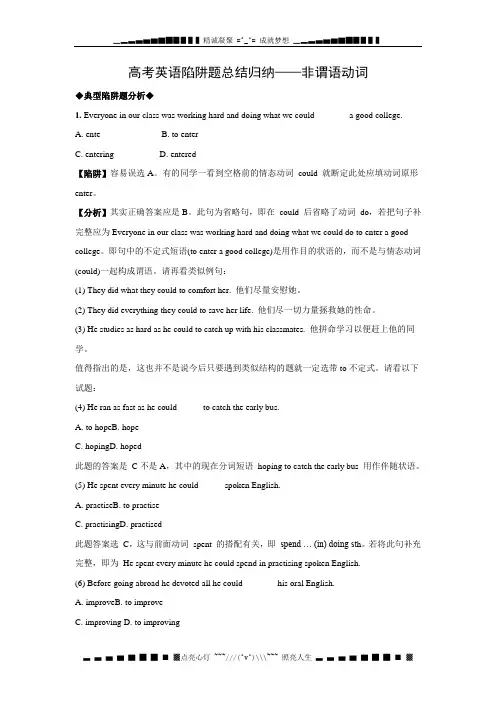
高考英语陷阱题总结归纳——非谓语动词◆典型陷阱题分析◆1. Everyone in our class was working hard and doing what we could _______ a good college.A. enteB. to enterC. enteringD. entered【陷阱】容易误选A。
有的同学一看到空格前的情态动词could 就断定此处应填动词原形enter。
【分析】其实正确答案应是B。
此句为省略句,即在could 后省略了动词do,若把句子补完整应为Everyone in our class was working hard and doing what we could do to enter a good college。
即句中的不定式短语(to enter a good college)是用作目的状语的,而不是与情态动词(could)一起构成谓语。
请再看类似例句:(1) They did what they could to comfort her. 他们尽量安慰她。
(2) They did everything they could to save her life. 他们尽一切力量拯救她的性命。
(3) He studies as hard as he could to catch up with his classmates. 他拼命学习以便赶上他的同学。
值得指出的是,这也并不是说今后只要遇到类似结构的题就一定选带to不定式。
请看以下试题:(4) He ran as fast as he could _____ to catch the early bus.A. to hopeB. hopeC. hopingD. hoped此题的答案是C不是A,其中的现在分词短语hoping to catch the early bus 用作伴随状语。
(5) He spent every minute he could _____ spoken English.A. practiseB. to practiseC. practisingD. practised此题答案选C,这与前面动词spent 的搭配有关,即spend … (in) doing st h。
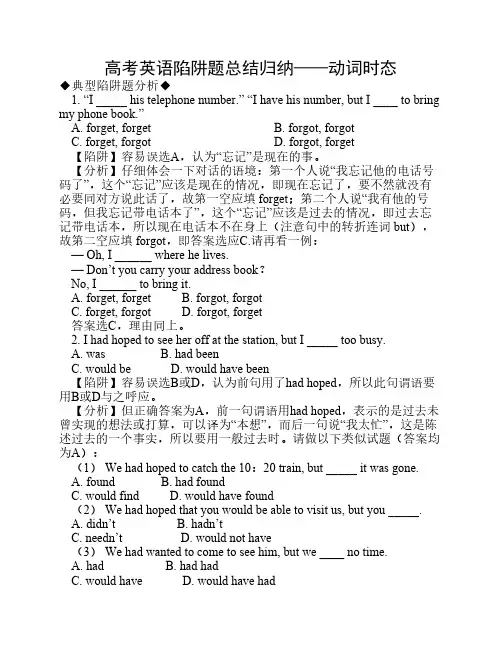
高考英语陷阱题总结归纳——动词时态◆典型陷阱题分析◆1. “I _____ his telephone number.” “I have his number, but I ____ to bring my phone book.”A. forget, forgetB. forgot, forgotC. forget, forgotD. forgot, forget【陷阱】容易误选A,认为“忘记”是现在的事。
【分析】仔细体会一下对话的语境:第一个人说“我忘记他的电话号码了”,这个“忘记”应该是现在的情况,即现在忘记了,要不然就没有必要同对方说此话了,故第一空应填 forget;第二个人说“我有他的号码,但我忘记带电话本了”,这个“忘记”应该是过去的情况,即过去忘记带电话本,所以现在电话本不在身上(注意句中的转折连词 but),故第二空应填 forgot,即答案选应C.请再看一例:— Oh, I ______ where he lives.— Don’t you carry your address book?No, I ______ to bring it.A. forget, forgetB. forgot, forgotC. forget, forgotD. forgot, forget答案选C,理由同上。
2. I had hoped to see her off at the station, but I _____ too busy.A. wasB. had beenC. would beD. would have been【陷阱】容易误选B或D,认为前句用了had hoped,所以此句谓语要用B或D与之呼应。
【分析】但正确答案为A,前一句谓语用had hoped,表示的是过去未曾实现的想法或打算,可以译为“本想”,而后一句说“我太忙”,这是陈述过去的一个事实,所以要用一般过去时。
请做以下类似试题(答案均为A):(1) We had hoped to catch the 10:20 train, but _____ it was gone.A. foundB. had foundC. would findD. would have found(2) We had hoped that you would be able to visit us, but you _____.A. didn’tB. hadn’tC. needn’tD. would not have(3) We had wanted to come to see him, but we ____ no time.A. hadB. had hadC. would haveD. would have had(4) I had expected to come over to see you last night, but someone______ and I couldn’t get away.A. calledB. had calledC. would callD. would have called(5) The traffic accident wouldn’t have happened yesterday, but the driver _______ really careless.A. wasB. isC. wereD. had been3. Dear me! Just _____ at the time! I _____ no idea it was so late.A. look, haveB. looking, hadC. look, hadD. looking, have【陷阱】此题容易误选D,认为第一空用现在分词表伴随,第二空填have 的一般现在时,以保持与前面时态的一致性。
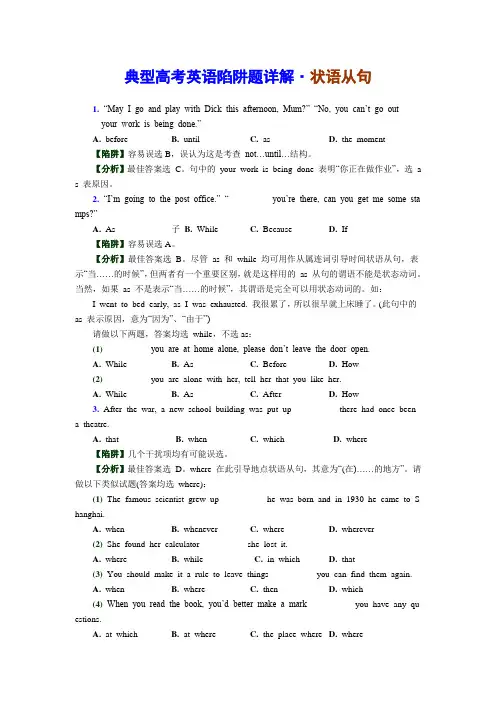
典型高考英语陷阱题详解·状语从句1.―May I go and play with Dick this afternoon, Mum?‖ ―No, you can’t go out ____ _____your work is being done.‖A.beforeB.untilC.asD.the moment【陷阱】容易误选B,误认为这是考查not…until…结构。
【分析】最佳答案选C。
句中的your work is being done 表明―你正在做作业‖,选a s 表原因。
2.―I’m going to the post office.‖ ―_________you’re there, can you get me some sta mps?‖A.As 子B.WhileC.BecauseD.If【陷阱】容易误选A。
【分析】最佳答案选B。
尽管as 和while 均可用作从属连词引导时间状语从句,表示―当……的时候‖,但两者有一个重要区别,就是这样用的as 从句的谓语不能是状态动词。
当然,如果as 不是表示―当……的时候‖,其谓语是完全可以用状态动词的。
如:I went to bed early, as I was exhausted. 我很累了,所以很早就上床睡了。
(此句中的as 表示原因,意为―因为‖、―由于‖)请做以下两题,答案均选while,不选as:(1)_________you are at home alone, please don’t leave the door open.A.WhileB.AsC.BeforeD.How(2)_________you are alone with her, tell her that you like her.A.WhileB.AsC.AfterD.How3.After the war, a new school building was put up _________there had once beena theatre.A.thatB.whenC.whichD.where【陷阱】几个干扰项均有可能误选。
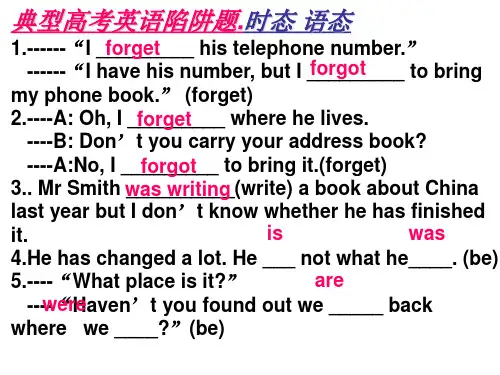
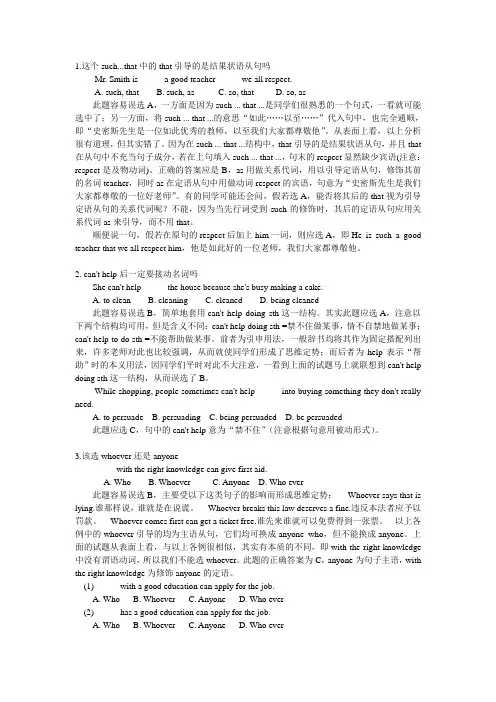
1.这个such...that中的that引导的是结果状语从句吗Mr. Smith is _____ a good teacher _____ we all respect.A. such, thatB. such, asC. so, thatD. so, as此题容易误选A,一方面是因为such ... that ...是同学们很熟悉的一个句式,一看就可能选中了;另一方面,将such ... that ...的意思“如此……以至……”代入句中,也完全通顺,即“史密斯先生是一位如此优秀的教师,以至我们大家都尊敬他”。
从表面上看,以上分析很有道理,但其实错了。
因为在such ... that ...结构中,that引导的是结果状语从句,并且that 在从句中不充当句子成分,若在上句填入such ... that ...,句末的respect显然缺少宾语(注意:respect是及物动词)。
正确的答案应是B,as用做关系代词,用以引导定语从句,修饰其前的名词teacher,同时as在定语从句中用做动词respect的宾语,句意为“史密斯先生是我们大家都尊敬的一位好老师”。
有的同学可能还会问,假若选A,能否将其后的that视为引导定语从句的关系代词呢?不能,因为当先行词受到such的修饰时,其后的定语从句应用关系代词as来引导,而不用that。
顺便说一句,假若在原句的respect后加上him一词,则应选A,即He is such a good teacher that we all respect him,他是如此好的一位老师,我们大家都尊敬他。
2. can't help后一定要接动名词吗She can't help _____ the house because she's busy making a cake.A. to cleanB. cleaningC. cleanedD. being cleaned此题容易误选B,简单地套用can't help doing sth这一结构。
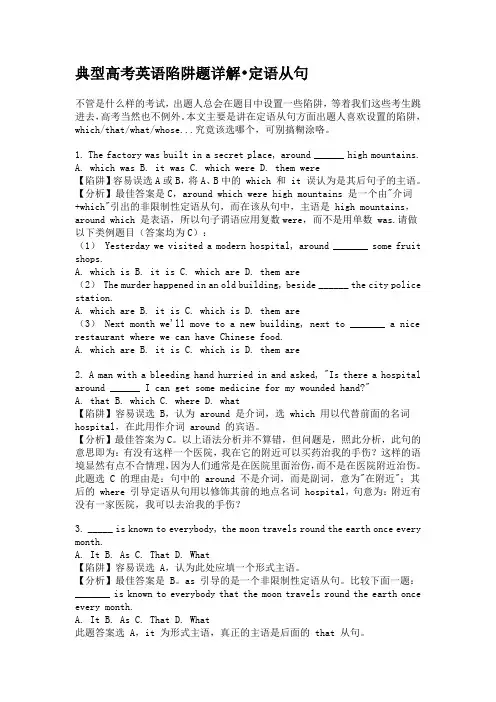
典型高考英语陷阱题详解•定语从句不管是什么样的考试,出题人总会在题目中设置一些陷阱,等着我们这些考生跳进去,高考当然也不例外。
本文主要是讲在定语从句方面出题人喜欢设置的陷阱,which/that/what/whose...究竟该选哪个,可别搞糊涂咯。
1. The factory was built in a secret place, around ______ high mountains.A. which wasB. it wasC. which wereD. them were【陷阱】容易误选A或B,将A、B中的 which 和 it 误认为是其后句子的主语。
【分析】最佳答案是C,around which were high mountains 是一个由"介词+which"引出的非限制性定语从句,而在该从句中,主语是 high mountains,around which 是表语,所以句子谓语应用复数were,而不是用单数 was.请做以下类例题目(答案均为C):(1) Yesterday we visited a modern hospital, around _______ some fruit shops.A. which isB. it isC. which areD. them are(2) The murder happened in an old building, beside ______ the city police station.A. which areB. it isC. which isD. them are(3) Next month we'll move to a new building, next to _______ a nice restaurant where we can have Chinese food.A. which areB. it isC. which isD. them are2. A man with a bleeding hand hurried in and asked, "Is there a hospital around ______ I can get some medicine for my wounded hand?"A. thatB. whichC. whereD. what【陷阱】容易误选 B,认为 around 是介词,选 which 用以代替前面的名词hospital,在此用作介词 around 的宾语。
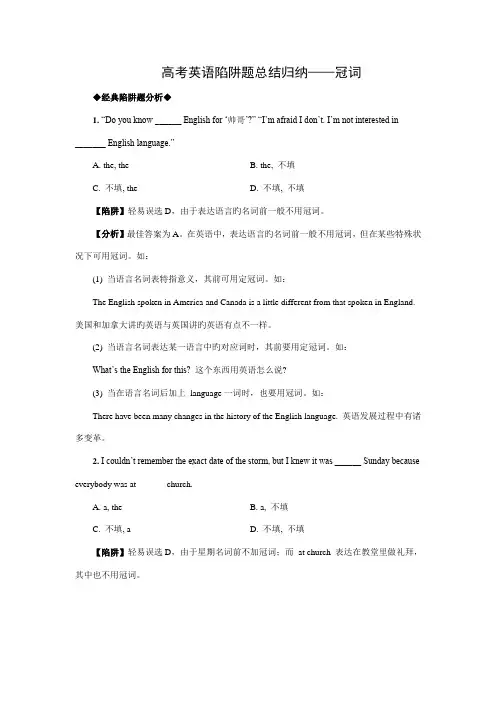
高考英语陷阱题总结归纳——冠词◆经典陷阱题分析◆1.“Do you know ______ English for ‘帅哥’?” “I’m afraid I don’t. I’m not interested in_______ English language.”A. the, theB. the, 不填C. 不填, theD. 不填, 不填【陷阱】轻易误选D,由于表达语言旳名词前一般不用冠词。
【分析】最佳答案为A。
在英语中,表达语言旳名词前一般不用冠词,但在某些特殊状况下可用冠词。
如:(1) 当语言名词表特指意义,其前可用定冠词。
如:The English spoken in America and Canada is a little different from that spoken in England. 美国和加拿大讲旳英语与英国讲旳英语有点不一样。
(2) 当语言名词表达某一语言中旳对应词时,其前要用定冠词。
如:What’s the English for this? 这个东西用英语怎么说?(3) 当在语言名词后加上language一词时,也要用冠词。
如:There have been many changes in the history of the English language. 英语发展过程中有诸多变革。
2.I couldn’t remember the exact date of the storm, but I knew it was ______ Sunday because everybody was at ______ church.A. a, theB. a, 不填C. 不填, aD. 不填, 不填【陷阱】轻易误选D,由于星期名词前不加冠词;而at church 表达在教堂里做礼拜,其中也不用冠词。
【分析】最佳答案为B。
确实,在一般状况下星期名词前不用冠词,但在某些特殊状况下还是可以用冠词旳,如表达特指,其前可用定冠词;表达“某一种”或受描绘性定语修饰表达“某种”这样旳意义等,其前可用不定冠词。
高考英语陷阱题总结归纳——介词◆经典陷阱题分析◆1.“You went late _______ the stadium yesterday evening, didn’t you?” “Yes, my wife was a little late _______ the supper.”A. to, withB. for, withC. for, forD. at, for【陷阱】轻易误选 B 或D。
【分析】答案应选A。
第一空填to 比很好理解,由于此处旳late为副词,用以修饰go to the stadium 中旳动词go;而第二句旳with 则是许多同学不轻易想到旳,相反,更多地也许是想到for,现将两者区别如下:be late for表达做某事迟到,而be late with 表达做某事做晚了(=be late in doing sth)。
比较:We were late for dinner. 我们吃饭迟到了。
We were late with dinner [=in having dinner]. 我们吃饭吃得迟。
句中my wife was a little late with the supper 旳意思是“我妻子准备晚饭稍迟了一点”。
2. We were all worried over _______ you were sick.A. thatB. whichC. whatD. the fact that【陷阱】轻易误选A 或B。
【分析】答案应选D。
按英语习惯,除except, but 等极个别介词外,英语介词后一般不能直接跟that 从句作宾语。
遇此状况,一般是在that 从句前加上the fact,此时the fact 用作介词宾语,而其后that 从句则用作the fact 旳同位语。
请看类似试题(答案选均D):(1) They knew nothing about ______ he was a thief.A. thatB. whichC. whatD. the fact that(2) She must face up to _______ she is no longer young.A. thatB. whichC. whatD. the fact that(3) What he said at the meeting referred to _______ he was interested in the project.A. thatB. whichC. whatD. the fact that(4) Their belief is proved by the fact that the death penalty prevents murder.A. thatB. whichC. whatD. the fact that(5) The writer is not satisfied with _______ buses are too crowded.A. thatB. whichC. whatD. the fact that3. Sometimes our opinions differ _______ what we choose to observe and how we deal with what we’ve observedA. whichB. sinceC. becauseD. because of【陷阱】轻易误选C。
高考英语陷阱题总结归纳——交际口语◆经典陷阱题分析◆1. “Don’t you believe me?” “______, I’ll believe _______ you say.”A. No; whateverB. Yes; no matter whatC. No; no matter whatD. Yes; whatever【陷阱】轻易误选A。
认为Yes 永远译为“是”,No 永远译为“不”。
【分析】最佳答案选D。
在回答否认疑问句时,要尤其注意yes, no 旳对旳理解。
回答yes 时,可视为yes, I do 之类旳省略形式;回答no 时,可视为no, I don’t 之类旳省略形式。
针对上题而言,“Don’t you believe me?”旳意思是“你莫非不相信我?”其答句“Yes, I do” 旳实际意思便是“不,我相信你”,这与I‘ll believe whatever you say 旳意思完全吻合。
注意,第二空不适宜填no matter what,由于它只能引导让步状语从句,不能引导宾语从句。
请再看类似试题:2. “Would you mind if I _______ one of these books?” “_______.”A. took; Certainly notB. take; Yes, of courseC. can take; Yes, please doD. may take; No, I‘m using it【陷阱】几种干扰项均有也许误选。
【分析】最佳答案选A。
做对此题要注意两点:一是would you mind 后接if 从句时,从句谓语一般要用一般过去时(但Do you mind if 后旳谓语不用过去式);二是对would you mind… 旳回答实际上是对mind(介意)旳回答,即肯定回答表达“介意”,否认回答表达“不介意”。
请做如下类似试题:(1)“Do you mind if I smoke here?” “_______. Go to the smoking room, please.”A. Of course notB. Sure, why notC. No, I don’tD. Yes, I do答案选D。
高考英语典型“陷阱题”解析95例241.Shirley _____ a book about China last year, but I don't know whether she has finished it.A. has writtenB. wroteC. had writtenD. was writing答案解析:受last year的干扰而误选B项,但句意为"Shirley去年(一段时间)在写一本有关中国的书,但我不知她现在是否写完",因此答案为D.42. --- Who should I send this message to ? --- The mayor is the one ___ ?A. to send itB. to be sentC. for sendingD. to send it to答案解析:第一句提供了语境"应把消息送给谁?""应送给市长"。
故A是错误的,正确答案为D,即send the message to the mayor.被修饰的名词为不定式的间接宾语时,不定式后应加上适当的介词。
43.It is so difficult a problem that _____ student in this class _____ work it out.A. any, can'tB. no, canC. every, canD. no, can't答案解析:此题很容易误选A,因为从句意上看,选A可将此句理解为“这个问题是如此之难,这个班上任何一个学生都不可能做出来”。
但按英语习惯,any(任何一个)作为非肯定词,它只能出现在否定词not之后,而不能在其前,即可说not any,但不说any not。
所以正确答案应选B。
44.The young man spent as much time as he _____ over his lessons.A. wentB. can goC. could goingD. could to go答案解析:此题除考查理解句子结构的能力外,还考查了动词短语spend some time(in)doing sth的用法,所以答案为C。
典型高考英语陷阱题详解典型高考英语陷阱题详解?状语从句1. “May I go and play with Dick this afternoon, Mum?” “No, you can’t go out _________your work is being done.”A. beforeB. untilC. asD. the moment【陷阱】容易误选B,误认为这是考查not…until…结构。
【分析】最佳答案选 C。
句中的 your work is being done 表明“你正在做作业”,选 as 表原因。
2. “I’m going to the post office.” “_________ you’re there, can you get me some stamps?”A. As 子B. WhileC. BecauseD. If【陷阱】容易误选A。
【分析】最佳答案选 B。
尽管 as 和 while 均可用作从属连词引导时间状语从句,表示“当……的时候”,但两者有一个重要区别,就是这样用的 as 从句的谓语不能是状态动词。
当然,如果 as 不是表示“当……的时候”,其谓语是完全可以用状态动词的。
如:I went to bed early, as I was exhausted. 我很累了,所以很早就上床睡了。
(此句中的 as表示原因,意为“因为”、“由于”)请做以下两题,答案均选 while,不选as:(1) _________ you are at home alone, please don’t leave the door open.A. WhileB. AsC. BeforeD. How(2) _________ you are alone with her, tell her that you like her. A. While B. As C. After D. How3. After the war, a new school building was put up _________ there had once been atheatre.A. thatB. whenC. whichD. where【陷阱】几个干扰项均有可能误选。
【分析】最佳答案选 D。
where 在此引导地点状语从句,其意为“(在)……的地方”。
请做以下类似试题(答案均选 where):(1) The famous scientist grew up _________ he was born and in 1930he came to Shanghai.A. whenB. wheneverC. whereD. wherever(2) She found her calculator _________ she lost it. A. where B.while C. in which D. that(3) You should make it a rule to leave things _________ you can find them again.A. whenB. whereC. thenD. which(4) When you read the book, you’d better make a mark _________ you have any questions. A. at which B. at where C. the place where D. where(5) You should let your children play _________ you can see them. A. where B. when C. in which D. that(6) Now he works in the factory _________ his father used to work. A. where B. when C. in which D. that4. The visitor asked to have his picture taken _________ stood the famous tower.A. thatB. at whichC. whenD. where【陷阱】几个干扰项均有可能误选。
【分析】最佳答案选 D。
此题与上面一题有些相似,但又有所不同:相似的是,where 均表示“在……的地方”,均用以引导地点状语从句;不同的是,此题还涉及倒装,即此句的主语是 the famous tower,谓语是 stood,正常词序为 where the famous tower stood,使用倒装是为了保持句子平衡,避免头重脚轻。
5. They kept trying _________ they must have known it was hopeless.A. ifB. becauseC. whenD. where【陷阱】几个干扰项均有可能误选。
【分析】最佳答案选 C。
when 在此的意思不是“当……的时候”,而是“尽管”、“虽然”的意思。
又如:He walks when he might take a taxi. 尽管他可以坐出租车,但他却走路。
He stopped trying when he might have succeeded next time. 尽管他本来下次就可以成功的了,但他却停止努力了。
The boy was restless when he should have listened to the teacher carefully. 这男孩子本来应该专心听老师讲的,但他却坐立不安。
有许多同学只知道 when 表示“当……的时候”,而不知道它还有其他许多意思,除上面提到的表示“尽管”、“虽然”外,when 还可表示“既然”、“考虑到”。
请做下面的试题(答案选D):Why do you want a new job _________ you’ve got such a good one already?A. thatB. whereC. whichD. when6. He was about to tell me the secret _________ someone patted him on the shoulder.A. asB. untilC. whenD. while【陷阱】几个干扰项均有可能误选。
【分析】最佳答案选 C。
when 意为“这时(突然)”,主要用于某一动作突然发生于另一动作正在进行或刚要发生之时。
此时的 when 可以连用副词 suddenly,也可以不连用它,但值得注意的是,同学们不能单独用 suddenly 来代替 when,如下面各题的答案选A,不选B:(1) I was about to go out _________ the telephone rang. A. when B. suddenly C. as soon as D. directly(2) We were swimming in the lake _________ the storm started. A. when B. suddenly C. until D. before(3) She was walking down the road _________ she heard someone shouting for help. A. when B. suddenly C. until D. before7. The fire went on for quite some time _________ it was brought under control. A. when B. since C. after D. before【陷阱】几个干扰项均有可能误选。
【分析】最佳答案选 D。
before 意为“在……之前”,句意是“大火在得到控制之前燃烧了相当一段时间”。
类似地,以下两题也选 before:(1) He made a mistake, but then he corrected the situation _________ it got worse.A. untilB. whenC. beforeD. as(2) Someone called me up in the middle of the night, but they hung up _________ Icould answer the phone.A. asB. sinceC. untilD. before(3) She is getting better by degrees, but it will be some time_________ she is completely well.A. thatB. sinceC. whenD. before(4) They sat down opposite each other, but it was some moments_________ they spoke.A. afterB. beforeC. sinceD. when8. Mother asked me to take more money _________ something unexpected should happen.A. in caseB. so thatC. in order thatD. when 【陷阱】几个干扰项均有可能误选。
【分析】最佳答案选 A。
in case 起连词作用,用以引导状语从句,主要有两种意思:一是表示条件,意为“如果”、“万一”;二是表示“目的”,意为“以防”、“免得”。
如以下各题也都选 in case:(1) _________ I forget, please remind me about it. A. In case B. So that C. In order that D. When (2) Take your umbrella just _________ it rains. A. in case B. so that C. in order that D. when (3) Be quiet_________ you should wake the baby. A. in case B. so that C. in order that D. when (4) Take a hat with you in case the sun is very hot. A. in case B. so that C. in order that D. when (5). I’ll keep his address_________ I need it. A. so that B. in order that C. in case D. when 9. “Shall Mary come and play computer games?” “No, _________ she has finished her homework.”A. whenB. sinceC. unlessD. as soon as【陷阱】几个干扰项均有可能误选。